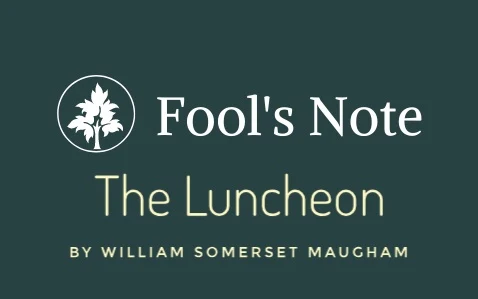Reality vs Appearance in the story Luncheon by William Somerset Maugham
Appearance vs. Reality: A Deep Dive into W. Somerset Maugham’s “The Luncheon”
The well-known English author William Somerset Maugham examines the theme of appearance vs. reality in his short story "The Luncheon," showing how things can appear one way on the surface but be completely different on the inside. Maugham uses wit and irony to highlight the social intricacies and the fallaciousness of appearances in interpersonal relationships.
Premise of the Story
The narrator of “The Luncheon” is a young and struggling writer. He tells the story of a woman who says she loves his writing and contacts him, saying she would really like to meet him. The young writer is flattered by her praise and consents to meet her at Foyot's, a classy Parisian restaurant renowned for its pricey menu and opulent ambiance. The young writer agrees to meet the woman despite knowing that Foyot's is well beyond his means, in part out of politeness and in part out of vanity.
The lady appeared polite but deceptive.
The woman initially appears to be the epitome of the perfect guest—polite, sophisticated, and well-behaved. She talks about how modest she is and reiterates multiple times that she never orders much when she eats out. She even reassures the young author that she stays away from luxuries and prefers light, simple meals. This depiction of the woman gives the reader and narrator the first impression that she is modest and restrained, leading them to believe that she is a thoughtful and modest individual.
However, the truth starts to come to light as the meal goes on. In contrast to her previous claims, the woman begins to order an increasing number of dishes, including peaches, salmon, asparagus, champagne, caviar, and even ice cream. Despite her repeated claims that she doesn't eat much, her behavior contradicts her statements. This contradiction between her words and deeds serves as the central theme of the narrative, which is appearance versus reality. She is motivated by indulgence and greed rather than being the disciplined, modest woman she initially seemed to be.
An Uncomfortable and Inconsistent Dinner
Throughout the meal, the woman doesn't show any awareness of how much the young writer is having to pay for her lavish meal. Since this is their first meeting together, she appears to be oblivious to the fact that, as the guest, she should be considerate of the writer's budget. The writer, meanwhile, becomes more and more uneasy and nervous as he attempts to figure out how much he will have to pay. The lady's self-centered demeanor combined with the lavish meal makes the young writer feel trapped and powerless.
The author remains silent in spite of his uneasiness. Instead of confronting the woman about her excessive orders or her lack of empathy, he quietly suffers. This scenario is a reflection of the social dynamics that frequently arise in real life, where people may take advantage of others without fully comprehending or caring about the consequences, and appearances can conceal true intentions.
The Title's Irony
The irony in the title "The Luncheon" is essential to the meaning of the narrative. A "luncheon" is typically thought of as a light, informal meal. The lunch in Maugham's story, however, is anything but light—what starts out as a simple, modest meal eventually transforms into an extravagant, multi-course feast. This inconsistency between the story's title and actual events draws attention to the theme of appearance versus reality. The woman's assertion of moderation completely contradicts her behavior, highlighting the discrepancy between her public persona and her true self.
The Final Twist
At the story's conclusion, the young author recalls the incident with humor rather than bitterness. Years later, he remembers their luncheon when he sees the woman again, who is now older and overweight. The story's ending, which shows that although the woman's appearance has changed over time, her behavior has remained as self-centered and selfish as it was when they first met, supports Maugham's ironic approach. After learning his lesson, the incident becomes a memorable—if somewhat embarrassing—part of the writer's life.
Conclusion
William Somerset Maugham provides a scathing critique of the discrepancy between appearance and reality in "The Luncheon." Maugham examines how people can conceal their true selves behind the façade of politeness, making it difficult for others to see them, by looking at the woman's actions in the story. Maugham shows readers that reality frequently lurks beneath the surface and that first impressions can be misleading through his use of irony and witty storytelling.
[#TheLuncheon #WilliamSomersetMaugham #ShortStoryAnalysis #EnglishLiterature #AppearanceVsReality #LiteraryThemes #IronyInStories #Class12English]



Appotube
ردحذفDownload app from AppoTube.com<
Download android app from AppoTube.com
Download iOS app from AppoTube.com
Download Mac app from AppoTube.com
Download windows app from AppoTube.com
Appotube.com
Download crack app from AppoTube.com
Download paid app from AppoTube.com
Download free app from AppoTube.com
Download latest app from AppoTube.com
Download mod app from AppoTube.com
Download today app from AppoTube.com